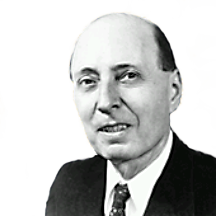Eugene Wigner was born in Budapest in 1902. In 1925 he received his doctorate degree in engineering from the University of Berlin and in 1930 he immigrated to the United States, where he took part in theoretical nuclear research at Princeton University. In 1942, Wigner joined the Manhattan project, set up by president Roosevelt to produce an atom bomb.
After the Second World War, Wigner was in charge of research and development, under the atomic energy commission. Wigner often expressed his disappointment that atomic energy was used mainly for war, rather then for peace.
Eugene Wigner received the 1963 Nobel prize in physics, “For his contributions to the theory of the atomic nucleus and the elementary particles, particularly through the discovery and application of fundamental symmetry principles.”
Wigner made a major contribution to science by introducing symmetry laws and mathematical group theory into nuclear and particle physics.
In so doing, he turned some of the most abstract mathematical concepts into useful tools of contemporary physics.
His work enables one to predict the probability of nuclear reactions, and has been of great importance to nuclear research.
Eugene Wigner passed away in 1995.
advanced contemporary nuclear physics.



